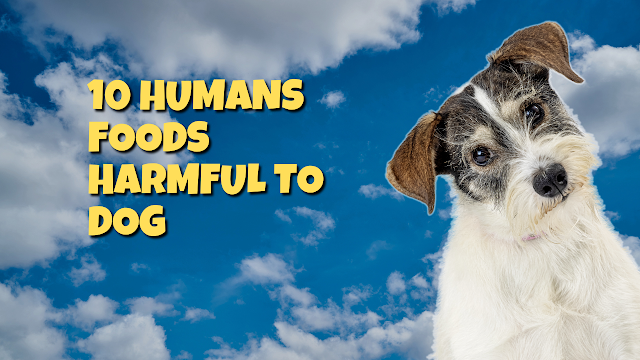10 Human Foods That Are Harmful to Dogs
As pet owners, we often share our food with our beloved canine companions, but not all human foods are safe for dogs to consume. Some common foods that we enjoy can be harmful or even toxic to dogs, leading to serious health issues. To keep your furry friend healthy and happy, it's crucial to be aware of which foods to avoid feeding them. Here are 10 human foods that are bad for dogs:
1. Chocolate:
Chocolate contains theobromine and caffeine, which are toxic to dogs and can lead to symptoms such as vomiting, diarrhea, rapid breathing, increased heart rate, and even seizures or death.
2. Grapes and Raisins:
Grapes and raisins can cause kidney failure in dogs, even in small amounts. Symptoms may include vomiting, diarrhea, lethargy, and decreased appetite.
3. Onions and Garlic:
Onions and garlic, whether raw, cooked, or powdered, contain compounds that can damage a dog's red blood cells, leading to anemia. Symptoms may include weakness, lethargy, pale gums, and rapid breathing.
4. Xylitol:
Xylitol is a sugar substitute commonly found in sugar-free gum, candy, baked goods, and some peanut butter. In dogs, xylitol can cause a sudden release of insulin, leading to hypoglycemia (low blood sugar), seizures, and liver failure.
5. Avocado:
Avocado contains persin, a substance that can be toxic to dogs in large amounts. While the flesh of the avocado is not as harmful, the pit, skin, and leaves contain higher concentrations of persin and should be avoided.
6. Alcohol:
Alcohol can have a more potent effect on dogs than humans, leading to symptoms such as vomiting, diarrhea, difficulty breathing, coordination problems, coma, and even death. Keep alcoholic beverages out of reach of your pets at all times.
7. Macadamia Nuts:
Macadamia nuts are toxic to dogs and can cause weakness, vomiting, tremors, and hyperthermia (elevated body temperature). Even a small amount of macadamia nuts can be harmful to dogs.
8. Raw Dough:
Raw bread dough can expand in a dog's stomach, leading to bloating and potentially life-threatening gastric dilatation and volvulus (GDV), also known as bloat. Additionally, the yeast in raw dough produces alcohol, which can cause alcohol poisoning in dogs.
9. Bones:
Cooked bones, especially those from poultry or fish, can splinter and cause choking, gastrointestinal obstruction, or puncture wounds in a dog's digestive tract. It's best to avoid feeding any cooked bones to dogs.
10. Dairy Products:
While small amounts of plain, unsweetened yogurt or cheese may be tolerated by some dogs, many dogs are lactose intolerant and may experience digestive upset, such as diarrhea or gas, from consuming dairy products.
Conclusion:
As responsible pet owners, it's essential to be mindful of what we feed our dogs to ensure their health and safety. While some human foods may be safe for occasional treats, it's best to stick to a balanced diet formulated specifically for dogs.
If you suspect that your dog has ingested any harmful foods or is experiencing symptoms of poisoning, contact your veterinarian or an emergency animal clinic immediately. By being vigilant and informed, we can keep our furry friends healthy and thriving for years to come.





Comments
Post a Comment